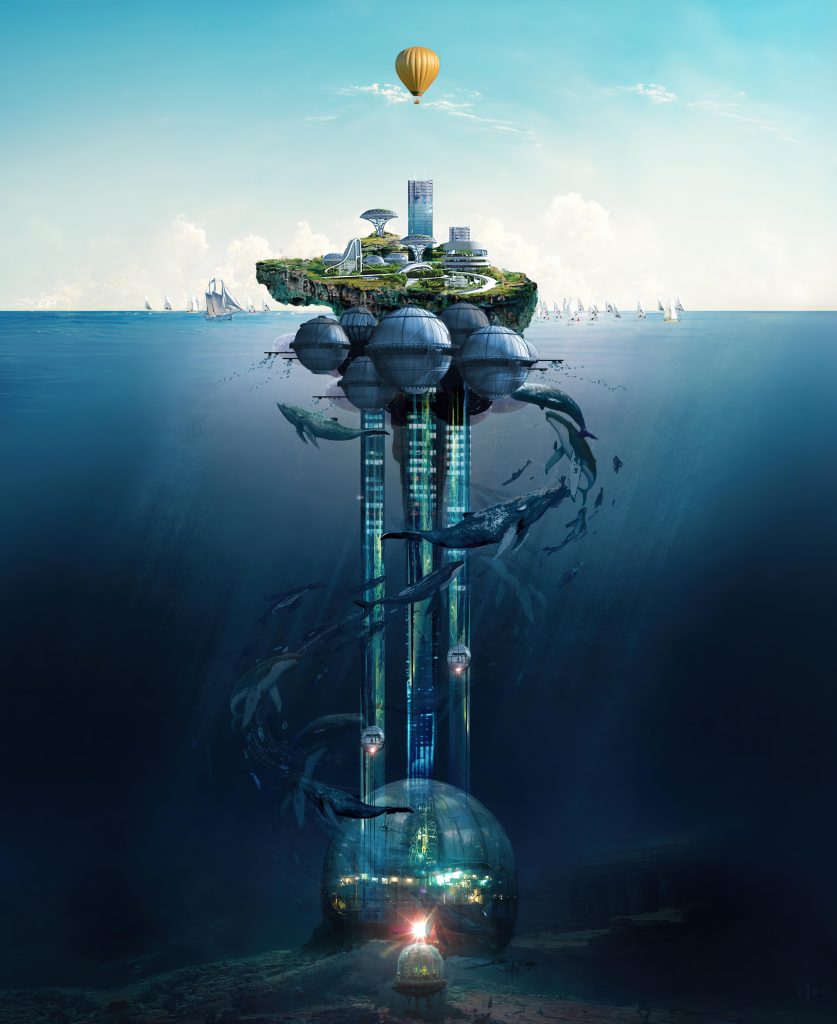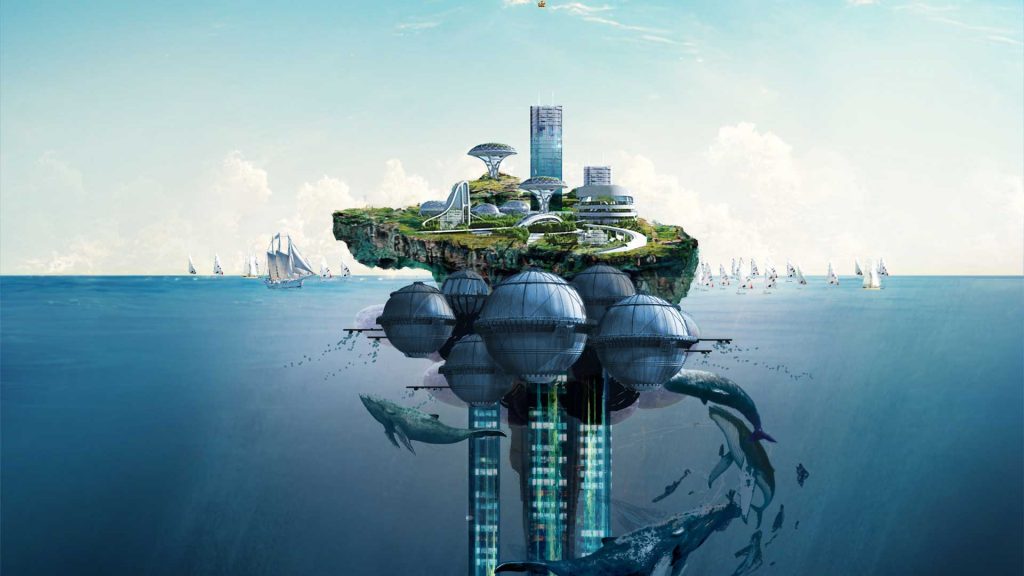Click here for English version
Das Ocean Future Lab Projekt hat 2022 mit bisher 4 Online Workshops, einem Hackathon sowie 4 Präsenzworkshops im Deutschen Schifffahrtsmuseum Bremerhaven (DSM), dem Ozeaneum – das Deutsche Meeresmuseum Stralsund (DMM), im Futurium Berlin sowie an der Berlin International University Berlin stattgefunden.
In den Workshops wurden utopische Narrative zur Frage „Wie wollen wir mit den Meeren leben?“ transdisziplinär und co-kreativ entwickelt. Einige dieser Narrative sind von beteiligten Künstler:innen visualisiert worden. Sie werden in Ausstellungen der Partner-Museen, im Internet und Social Media präsentiert werden, um den Dialog mit einem größeren Publikum zu erweitern.
Jan Schneider übernahm zwei Visualisierungen. Der studierte Kommunikationsdesigner und Szenograph arbeitet als Concept-Artist, 3-D Modeler (Video Games) und Set-Designer für Animation und Liveaction-Film in Berlin. Von 2009–2014 war er künstlerischer Mitarbeiter im Fachbereich Szenographie, HFF Konrad Wolf Potsdam. Seit 2014 ist er Lehrbeauftragter für „Digitales Bild“ an der Filmuniversität Babelsberg.
ARTIST STATEMENT:
Dieses Bild ist eine übermalte digitale Fotomontage. Durch den vordergründigen Fotorealismus wird der Eindruck erweckt, es handle sich um die Visualisierung von realen Begebenheiten oder einer in Planung befindlichen konkreten Idee. Um diesen Eindruck zu brechen, habe ich eine symmetrische Bildkomposition gewählt, die das Dargestellte künstlich überhöht und surreal erscheinen lässt.
DAS NARRATIV:
Das Thema fokussiert auf Meeresbürger:in. Es sollen möglichst viele Menschen zu Meeresbürger:innen werden, damit jede:r durch nachhaltiges Verhalten zu einer lebenswerten Zukunft auf unserem blauen Planeten beitragen kann. Daher wird ein Projekt initiiert, das Einblicke in die wissenschaftliche Forschung in der schwer zugänglichen Tiefsee bieten soll. Es vermittelt schwer zu vermittelndes Wissen darüber und stellt emotionale Verbindungen her, um die Köpfe und Herzen der Menschen zu berühren. 2050 soll diese sehr innovative Station mitten auf dem offenen Meer realisiert sein, wovon ein direkter Zugangspunkt zur Tiefsee gebaut wird. Für diesen Bau werden nur nachhaltige Ressourcen verwendet und die gesamte benötigte Energie aus den Ozeanen gewonnen. Auch die Nahrung für Forschende und Besucher:innen wird direkt auf dieser Station angebaut. Der Bahnhof, von dem es zur Tiefsee geht, ist als Erlebnisraum für nachhaltiges Wohnen und Erholen anerkannt.
Die Zukunft liegt nicht im Weltall, sondern im Ozean. Wenn diese Station entwickelt wird, können mobile Stationen dupliziert werden, um problematische Meeresregionen wie die der Müllstrudel zu erreichen, und lösen das Problem direkt vor Ort.
DIE VISUALISIERUNG

ÜBER DAS OCEAN FUTURE LAB
Das Ocean Future Lab ist ein Projekt des „Wissenschaftsjahres 2022 – Nachgefragt!“ und wird vom Bundesministerium für Bildung und Forschung gefördert. Partner sind die Deutsche Allianz Meeresforschung, das Institute for Art and Innovation sowie das Deutsche Meeresmuseum, das Deutsche Schifffahrtsmuseum in Kooperation mit dem Futurium Berlin sowie der Filmuniversität Babelsberg.
English Version
So far in 2022, the Ocean Future Lab project has held 4 online workshops as well as face-to-face workshops at the German Maritime Museum in Bremerhaven, the Ozeaneum – the German Maritime Museum in Stralsund, the Futurium Berlin and the Berlin International University Berlin.
In the workshops, utopian narratives on the question “How do we want to live with the oceans?” were developed in a transdisciplinary and co-creative way. Some of these narratives have been visualized by participating artists. Now we want to present these results to you. They will be presented in exhibitions of the participating museums, on the internet and social media to broaden the dialogue with a larger audience.
Jan Schneider was commissioned for two visualizations. The graduate communication designer and scenographer works as a concept artist, 3D modeler (video games) and set designer for animation and live action films in Berlin. From 2009-2014 he was an artistic assistant in the scenography department at HFF Konrad Wolf Potsdam. Since 2014 he has been a lecturer in “Digital Image” at the Film University Babelsberg.
ARTIST STATEMENT:
This image is an overpainted digital photomontage. The superficial photorealism gives the impression that it is about the visualization of real events or a concrete idea that is in the planning stage. In order to break this impression, I chose a symmetrical image composition that makes what is depicted appear artificially exaggerated and surreal.
THE NARRATIVE:
The topic focuses on ocean lovers. It is intended to let as many people as possible become ocean lovers so that each one can contribute to a livable future on our blue planet by behaving in a sustainable way. Therefore, a project is initiated to offer insights in scientific research in the hardly accessible Deep Sea. Because facts are hard to transmit and therefore emotional connections need to be made to touch people’s minds and hearts. In 2050 there will be a very progressive station in the middle of the open sea where a direct entry point to the deep sea is constructed. For that construction only sustainable resources are used and all needed energy is processed out of the oceans. Also the food is grown directly in this station. Therefore the station is recognized as an experience space for sustainable living and recreation.
Our future is not in outer space but in the ocean. If this station is developed then we can duplicate mobile stations to reach out to problematic maritime regions such as the garbage patches and will solve the problem right on site.
THE VISUALIZATION

ABOUT THE OCEAN FUTURE LAB
The Ocean Future Lab is a project of the “Science Year 2022 – Participate!” and is funded by the German Federal Ministry of Education and Research. Partners are the German Alliance for Marine Research, the Institute for Art and Innovation as well as the German Oceanographic Museum in Stralsund, the German Maritime Museum in Bremerhaven in cooperation with Futurium Berlin and the Babelsberg Film University.
